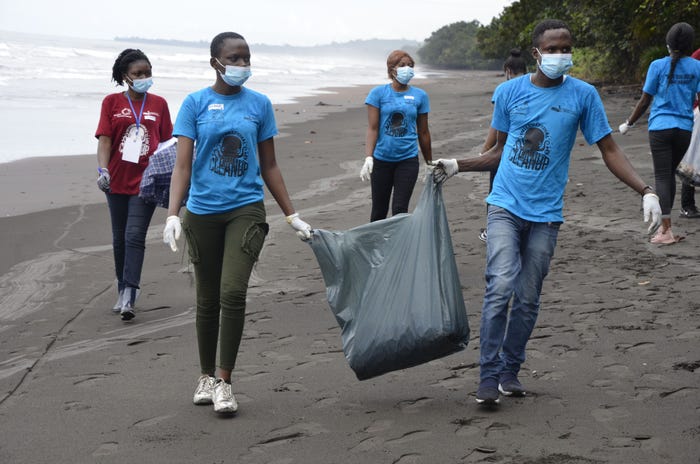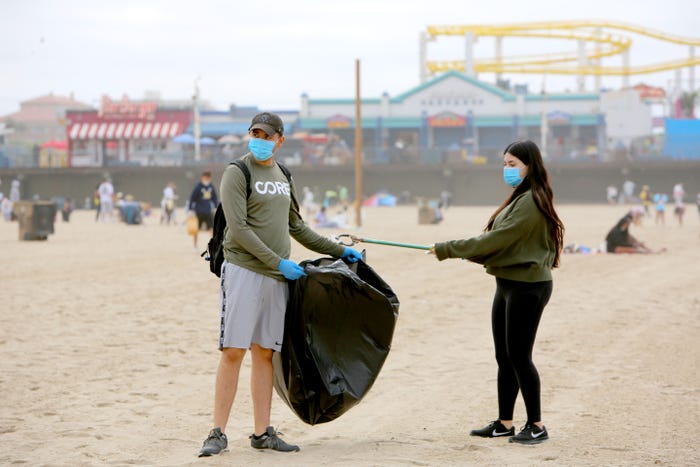International Coastal Cleanup Supports Plastic Reduction Efforts with Data Collection
The Ocean Conservancy kicked off its 36th annual International Coastal Cleanup (ICC) campaign on Sept. 17, 2022. For many participants, this was their first ICC event since the pandemic began.

The Ocean Conservancy kicked off its 36th annual International Coastal Cleanup (ICC) campaign on Sept. 17, 2022. For many participants, this was their first ICC event since the pandemic began.
The organization's goal was simply to "inspire people to come inspire people to come out, get their hands dirty, and make and see change for themselves," said ICC Director Allison Schutes, explaining 2022's #SeatheChange campaign slogan.
She added that cleanups create "an immediate, positive impact on the surrounding environment and community."
Going back to 1986, the Ocean Conservancy estimated that 350 million pounds of trash has been removed from global beachs and waterways since the event began. More than 17 million volunteers have participated and cataloged every item found to contribute to a repository of marine debris data.
The repository is a bank of information for scientists, environmentalists, governments and others who wish to unravel and dissect the issues around global plastic pollution. Along with being cited in more than two dozen peer-reviewed scientific publications in 2021, the data have been leveraged to back policies to mitigate single-use plastic pollution.
The types of items collected are "relatively consistent" from country to country. Schutes noted that cigarette butts – which contain plastic filters – and single-use plastic food and beverage packaging are the most common items recovered.
"If you can name it, we’ve probably seen it. Bowling balls, wedding dresses, rubber chickens, even the proverbial kitchen sink, although in my case it was a bathroom vanity. Nothing surprises me anymore," Schutes commented.

Volunteers walk the Ngeme-Batoke Coastline. Photo Credit: Miracle Vision
Extrapolating data based around waste volumes is more difficult because it depends on factors such as the number of volunteers, the amount of time spent cleaning up and others.
The Ocean Conservancy has partnered with organizations in California, Hong Kong and Mexico and across the globe which churn out thousands of participants each year. These collaborations produce "extraordinary itemized data," Schutes noted, such as a partner in Ghana that continued to count collected items for days following the cleanup.
However, what matters is not the amount of trash generated or the number of volunteers but rather that "no matter where you are in the world, if you look for trash on a beach or along a river, you will find it, and more often than not it will be made of plastics," she emphasized.

ICC volunteers in Santa Monica, Calif. Photo Credit: Rachel Murray/Getty Images
U.S. Plastics Policy
With the U.S. plastic recycling rate hovering around 5 percent and maintaining a single-digit status the past few years, the Ocean Conservancy worked alongside California State Senator Ben Allen to pass SB54.
The organization stated that just one of the bill's provisions could lead to an estimated 23 million tons of plastic waste reduction over the next decade.
Speaking further on legislative efforts, Schutes said: "In addition to the source reduction approach in SB54, we support bans on single-use plastics that are most common in and damaging to our oceans, like plastic grocery bags, foam food ware and utensils." The organization also has set placed its support behind extended producer responsibility (EPR) legislation.
Maine and Oregon passed EPR legislation in 2021, followed by Colorado and California in 2022. More than a dozen states have considered using EPR legislation to improve recycling rates.
Schutes added that "we need a comprehensive approach to address our plastic pollution crisis and data from the ICC and other peer-reviewed studies make it clear tackling single-use plastics must be central."
About the Author
You May Also Like




.png?width=300&auto=webp&quality=80&disable=upscale)